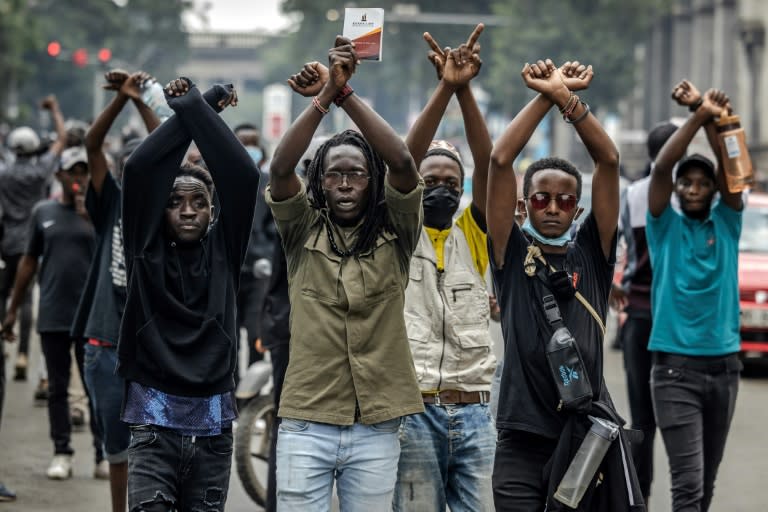One killed in Kenya protests amid calls for national strike

- Oops!Something went wrong.Please try again later.
A man died on the sidelines of mass demonstrations by Kenyan youth against proposed tax hikes, police said Friday, with protesters calling for a national strike in the coming week.
A police watchdog said it was investigating allegations that the man was shot by police after Thursday's demonstrations in the capital Nairobi.
Led largely by young Kenyans who livestreamed the demonstrations, the rallies began in Nairobi on Tuesday before spreading nationwide, with protesters on Friday sharing a poster calling for a national strike on June 25.
The protests have been galvanised by widespread discontent over President William Ruto's economic policies with many Kenyans already struggling to make ends meet.
Thursday's demonstrations in Nairobi were mostly peaceful, but officers fired tear gas and water cannon throughout the day in an attempt to disperse protesters near parliament.
The Independent Policing Oversight Authority (IPOA) said Friday it had "documented the death" of a 29-year-old man, "allegedly as a result of police shooting".
"The Authority has this morning launched investigations into the fatal shooting," the IPOA said in a statement, later adding that an autopsy would be undertaken.
According to a Nairobi police report seen by AFP, a 29-year-old man was taken to hospital in Nairobi's central district at around 7:00 pm (1600 GMT) on Thursday "unconscious with a thigh injury" before "succumbing" to his injuries, without giving further details.
Mathias Kinyoda, spokesman for Amnesty International Kenya, told AFP that "one demonstrator was shot yesterday in the CBD (central business district) as he was trying to run away from the police".
He said that the shooter "was wearing plain clothes but he was accompanying the police", and called for an investigation into the death.
"We saw what happened," a witness told AFP, describing how he was among people gathered on the second floor of a building.
"We could see police opening fire at the group that was gathered there," the man said.
"It was a police officer in a baseball cap, because he got down from a police vehicle and ran back to it after the shooting when the crowd dispersed."
Late Thursday, several organisations, including Amnesty International Kenya, said that at least 200 people were injured in Nairobi.
The Kenyan Red Cross said on X that eight people were in critical condition.
- 'National strike' -
As news of the demonstrator's death spread online, protesters shared a poster calling for a national strike on June 25.
"Tuesday 25th June: #OccupyParliament and Total Shutdown Kenya. A national strike," read a poster shared widely online, adding that "Gen Z are granting all hard working Kenyans a day off. Parents keep your children at home in solidarity."
The strike call followed demonstrations on Thursday when thousands assembled across the country, from the Indian Ocean city of Mombasa to Ruto's Rift Valley bastion of Eldoret.
Following smaller-scale demonstrations in Nairobi earlier in the week, the cash-strapped government agreed to roll back several tax hikes laid out in a new bill.
But Ruto's administration still intends to increase some taxes, defending the proposed levies as necessary for filling its coffers and cutting reliance on external borrowing.
After the decision to scrap levies on bread purchases, car ownership as well as financial and mobile services, the treasury warned of a 200-billion-shilling ($1.5-billion) shortfall.
The proposed taxes were projected to raise 346.7 billion shillings ($2.7 billion), equivalent to 1.9 percent of GDP, and reduce the budget deficit from 5.7 percent to 3.3 percent of GDP.
The government has now targeted an increase in fuel prices and export taxes to fill the void left by the changes, a move critics say will make life more expensive in a country battling high inflation.
Kenya is one of the most dynamic economies in East Africa but a third of its 51.5 million people live in poverty.
dyg-rbu/amu/ach

